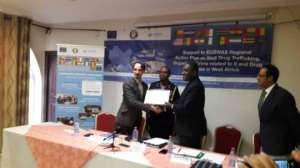
The European Union (EU) is supporting Ghana under a 14 million dollars facility to train and equip its law enforcement personnel with the technical expertise to combat drug trafficking, organised crime and it related drug abuse.
The EU support, which is being given to Ghana, forms part of a broader project, dubbed; 'Support to ECOWAS Regional Action Plan on Illicit Drug Trafficking, Organized Crime related to it and Drug Abuse in West Africa,' being implemented in five ECOWAS states, including Sierra Leone, Senegal, and Togo.
As part of the project, a Mobile Training Units (MTU) loaded with selected modules of the United Nations Office on Drugs and Crime (UNDOC) global e-learning programme based on a training needs analysis in ECOWAS countries were on Tuesday handed over to the Narcotic Control Board (NACOB) in Accra, at the opening of a four-day trainer of trainee workshop.
The MTU's will help in training personnel to be able to tackle border management and the fight against all forms of trafficking and countering terrorism, fight against money laundering as well as cybercrime.
Mr Sotirios Bazikanwe, Governance Advisor, EU, said drug trafficking was a global problem that had become increasingly worrying in West Africa since the early 2000s with the region becoming the hub for smuggling cocaine from South America to Europe.
He said even though the European and American anti-drug efforts had effectively curtailed the use of traditional smuggling routes, the drug traffickers had diverted the flows to West Africa.
'This climate of instability has created a breeding ground for organised crime to flourish, disrupted local economies with proceeds of crime and created a significant public health problem,' he said.
Mr Bazikanwe said the support project to ECOWAS therefore, sought to enhance the capabilities of countries to take sustainable actions against drug trafficking, human trafficking, drug abuse and transnational organised crime.
He said Ghana was the first country in ECOWAS to benefit from the training and that the training would help to establish computer based training centres in the selected member-states by deploying the MTU's in the operations of the security services.
Mr Francis Kofi Torkornoo, the Acting Executive Secretary of NACOB said the training would build on the capacities of the personnel to tackle drug trafficking and related crimes that continued to affect the economies of countries.
'This is an improved version of something that we received earlier about ten years ago, and officers would be tasked to do various modules, earn a pass mark and earn a certificate at the end of the training,' he said.
Mr Torkornoo said the training would help bring to the fore, the new modus operandi being used by drug traffickers to enable officials to effectively fight crime.
Mr Jullien Woirin, a Representative of UNDOC commended Ghanaian authorities for their commitment to ensuring continuous adaptive capacities building of its law enforcement agencies.
He expressed the UNDOC's commitment towards supporting ECOWAS member-states to fight crime and drug trafficking, which had adverse effect on the socio-economic status of countries.




 Saglemi Housing Project will not be left to rot – Kojo Oppong Nkrumah
Saglemi Housing Project will not be left to rot – Kojo Oppong Nkrumah
 Transport fares hike: GPRTU issue two-day ultimatum
Transport fares hike: GPRTU issue two-day ultimatum
 ARC endorses Alan as presidential candidate – Buaben Asamoa
ARC endorses Alan as presidential candidate – Buaben Asamoa
 Akufo-Addo appoints Kwasi Agyei as new Controller and Accountant-General
Akufo-Addo appoints Kwasi Agyei as new Controller and Accountant-General
 PNC dismiss reports of mass resignations
PNC dismiss reports of mass resignations
 PAC advocates for revenue collectors to be engaged on commission basis, not full...
PAC advocates for revenue collectors to be engaged on commission basis, not full...
 Genser Energy commissions 110km of natural gas pipeline at Anwomaso
Genser Energy commissions 110km of natural gas pipeline at Anwomaso
 Naa Torshie calls for tolerance, peace ahead of 2024 election
Naa Torshie calls for tolerance, peace ahead of 2024 election
 Asantehene commends Matthew Opoku Prempeh for conceiving GENSER Kumasi Pipeline ...
Asantehene commends Matthew Opoku Prempeh for conceiving GENSER Kumasi Pipeline ...
 Let’s do away with ‘slash and burn politics’ in Ghana — Dr Adutwum
Let’s do away with ‘slash and burn politics’ in Ghana — Dr Adutwum
